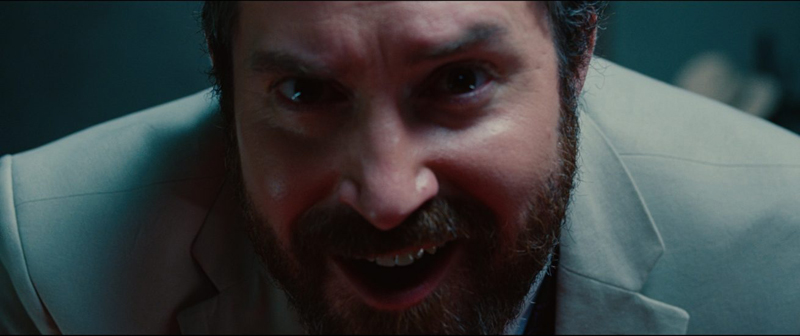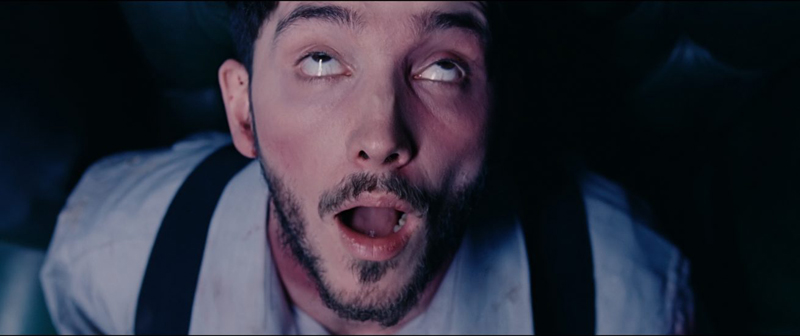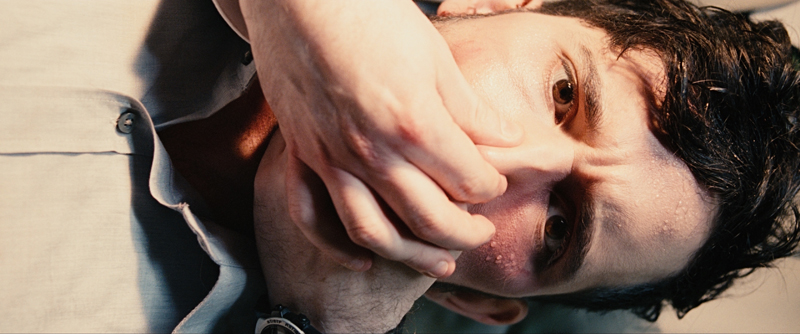Yesterday’s video premiere of “The Great Love Letter of This Great World” by Paul Weinfield and Beccs was a chance to look on the bright side despite current events. Today’s video premiere jumps to the opposite end of the spectrum. Transmission is set in what U.K.-based co-writers and directors Tom Hancock and Varun Raman all “a near-future dystopian Britain, now called Britannia.” Stark and surreal, it tells the story of a political prisoner and his overly cheery interrogator. The prisoner, Leonard, lives in abject terror as he is force-fed random images and stands on the edge of death while Dr. Sam, his white-suited warden, tries to get him to smile for the camera. Leonard can end all of this, he just has to sign the contract. Exactly what’s in that contract, we don’t know.
According to Hancock and Raman, the film was planned during a refugee crisis as a warning against British nationalism and its propensity to make people give up their basic freedoms. They feared it might not seem plausible to western audiences, but in the wake of Brexit in the U.K. and the election of Donald Trump in the U.S., and with the centennial of the Great Depression a little more than a decade away, it began to feel more real.
Watch the short below, and then read the Q&A with Hancock and Varan that follows to get a peek behind the story and its creation.
TRANSMISSION // AWARD-WINNING SHORT ON 35MM // WATCH NOW from PARALLEL MADNESS on Vimeo.
How do you write something that is so surreal and performance-based? I know you storyboarded every shot, but did you wind up having to rewrite or change things on the fly, depending on what you got from a day’s shooting?
Varun: We’ve always been fans of surrealism, whether it’s Lynch, Jodorowsky, Kaufman, etc. Our early unproduced short scripts were even weirder. So our brains have been wired that way, and we’ve been trying and learning how to make our work more normal and palatable for audiences ever since.
Tom: A lot of our previous un-produced shorts before this one have died normally due to over-reaching. So it was very important this one was a feasible two-hander, set in mainly two locations, and we challenged ourselves to make it as cinematic as possible. Which lent itself to being something performance based.
Varun: As it was our first real stab at a high production short, plus the added pressure of shooting on 35mm film, we storyboarded every shot in order to be prepared. I also made an animatic of the whole film with a separate document highlighting each shot and a script extract underneath to show us how long the shot would run for.
Tom: We has started with a very elaborate camera plot, so we inevitably had to cut shots, even scenes out, so we did have to think on the fly, combine certain shots and think what wouldn’t harm the continuity.
Varun: We had to cut out a scene involving a baby chick, a top hat and a chicken nugget. We really wished we could have kept it in, but if we persevered with getting that down, we wouldn’t have had a complete film in the end.

How did you find the right actors to play Dr. Sam and Leonard?
Tom: We met Michael Shon (Leonard) on a two-week film course in Manchester back in 2012 and we’ve kept in touch ever since. We both looked around the room and he stood out to us. We just knew by looking at him that he was a serious, dedicated actor.
Varun: Michael has been in a previous short film of ours, so we already had a rhythm with him that worked.
Tom: We found James Hyland (Dr. Sam) through Ian Pons Jewell when he was directing music videos.
Varun: He was great as a horrible, bigoted policeman in Tinie Tempah and Jargon’s Disappoint You. There’s this great monologue at the beginning of the video. We originally thought Ian wrote it but it turned out James did. Just goes to show how good he is.
What were your filmmaking experiences before tackling this project? How did you start working together?
Tom: We actually started working together on a student radio show at the University of Manchester in 2008.
Varun: We had made a couple ultra-low budget shorts before Transmission. The first one was made with us and three other friends in our living room.
Tom: The second was shot in a few locations around Manchester. Michael Shon was in it, along with another great actor, Daniel Campbell, who we’ve just done some sound studio work with and he’s doing very well himself at the moment.
Varun: We learned a lot of lessons on them, but we didn’t feel either of them were representative of what we wanted to make. We felt we could do a lot better.
Tom: Most of our learning has been through the screen writing, and the phantom projects that never got made but we got to the point of prepping and even story boarding a couple. So we’ve had a lot of mental prep.
Was it daunting to take on such a heavy concept so early on in your filmmaking careers?
Varun: No. It was a challenge but we were drawn to it. And I don’t think we could make anything normal even if we tried.
Tom: It was a bit. Part of us wasn’t entirely sure of what we were making but it felt right. And it seemed to get people we wanted to collaborate with excited, which was our only guide really. People we respected and were excited to work with, wanted to work with us on it, that’s the only guide we had. On paper it’s a weird script.
Are you a fan of other horror films and directors with a social conscience?
Varun: Yes. But every horror has a social conscience at its heart, and an inherent political statement. As much as some filmmakers like to say they aren’t making one, they are. They can’t get away from that. It’s a funny exercise to do with any film, there’s always at least a basic lesson to take away.
Tom: Telling someone how to feel doesn’t work. You’ve got to get them asking questions. The aim is to get them into that same headspace as a character who is in danger – you want them in that same primal state, where their actions are more involuntary and might be a bit more truthful with themselves about how they might act in a situation. Horrors are often a lot more about the private, internal world. But that is how people are formed. And that’s often where horrors kick off from, some sin has been committed, who should pay, or can someone be redeemed and forgiven.
Does horror have any unique properties that make it attractive for telling this kind of political story?
Tom: Horrors are always the films that come home with you. They play on your self preservation triggers. And there’s nothing clever about politics, it’s base really. At its heart it’s dirty, paranoid, and duplicitous. And it’s always back by the threat of violence by people who are bigger or who have greater means. The only thing the normal public have is there numbers.
Varun: It’s an inherently dark subject so there’s no getting away from the horror. The genre is made for this. They are to be experienced, not to be over-intellectualized and watched academically. They’re visceral, sensory, and meant to warn you about complacency.
What kind of an impact can this have on an audience, in terms of influencing their politics or thoughts on refugees and the post-Brexit/Trump future?
Varun: We’re not sure about influencing people’s politics. The film is probably too ambiguous to do that. Hopefully it’s open enough for people to draw their own parallels and make their own decisions.
Tom: There’s a good chance it just gets stuck in its own echo-chamber, preaching to the choir of the likely university graduate, left/liberal leaning audience of cinephiles in the cinema. Breaking echo-chambers should be the main mission of the 21st century. It’s the millennials’ only hope. Because there’s so many problems and in my lifetime I can’t think of any issue having been fixed. And that’s just political ones. They’ve just got worse. And now on top of that we’ve got an environmental shit storm coming.
Technological advance gives the illusion of progress but everything about the world right now is slipping backwards. We’re shifting up the gears when it comes to issues too, they are not slowing down. With the latest example being Bolsonaro’s election in Brazil. Things are only just getting started. You can see why the elite seem like they want to be as rich and powerful as possible for it when it all goes down. And if they keep the poor distracted and hating each other up until that point, then the super rich and super connected will be just fine. Divide and rule has always worked. It’s sad how easy it seems. As a film it’s a warning mechanism, it’s the canary dying in the cage. We can only try and add to the number of messages a people get, and hope the weight makes a difference. People need to start talking to people they never normal speak to really.

Do either of you have personal stories closely tied to this topic?
Varun: No. We’ve had generally much more comfortable, boring lives than this. I can relate to Leonard’s feeling of being othered and not fitting in. But that would be it.
Tom: Safety and stability are rare in this world and easy to lose. A Kafka type anxiety is a healthy one to have. A normal person’s world can turn upside down very quickly, without warning and for nearly inexplicable reasons. And they are pretty fragile too. As you get older you become more aware of the everyday act being political in some way. Saying ‘yes,’ ‘no,’ or staying silent are all ammunition to other people’s interpretations of you. No country is inherently above tearing itself apart. We are not better than that.
Would you be disappointed if someone just enjoyed this as dystopian horror and didn’t see the specific message behind it?
Varun: Not at all. I would be happy if someone enjoyed it as a weird little film and interpreted however they would like to. It’s ambiguous enough to be open to interpretation.
Tom: Yeah, we’ve heard quite a few different interpretations which is cool, it normally tells you a lot about a person and the history of the country they are from. We’ve heard some good interpretations from Eastern Europeans, Catholics, and Westerners. But we’d really love to hear what a Chinese audience would say, and South American, too.
The film looks beautiful – what did 35mm film give you that digital couldn’t? How did that contribute to the story?
Varun: We shot it on some of the last Fuji Eterna stock in the world. We’re glad we had the opportunity to shoot it. Film gives us a look that is just not possible with digital. If shooting something that is a dreamlike fantasy or a period piece, I think it has to be shot on film. Digital is too sharp and too clear. If I wanted something to look more like real life, I would say shoot it on digital. Of course, the economics of modern day filmmaking won’t allow for those types of decisions, but if we could have our way, we would shoot on film every single time.
Tom: I always say it’s something to do with those subliminal black frames between the exposed ones. The flickering process when you’re filming. When the camera’s ticking. The bits in between, that the eye makes up. It gets the viewer’s brain more involved, using the imagination more. So if it’s a story that is going to involve the metaphysical – for me, it’s always got to be film. You could say, no Tom, that’s a bunch of shit, and not possible, it’s still now a digital file that I’m watching right now – but I don’t care. No one else has put their finger on it yet, so that’s my take on why film is so good. It’s got an adrenaline rush factor to it too. Which seems to bring people’s A-games.
What’s next? What projects are you working on in the near future?
Varun: We’ve written a comedy feature called QUEEN + CoUNTRY for ourselves to direct.
Tom: It’s a real low brow take on the whole ridiculous Brexit affair. It represents any country though. However, it’s got quite a bit of British comedy we’ve ingested. A farce is the natural tone for it.
Varun: It’s a lot more straightforward than Transmission, but the elements of darkness, absurdity and surrealism are there. We would like to get the ball rolling on that project as soon as possible.
Tom: And we’ve just written a sci-fi pilot and series bible for the Berlinale Crystal Bear winners, Blue Shadows Films (Butterfly Kisses). They’re looking to partner up with US-based production companies.
Varun: We also have a horror script in the works, also for ourselves to direct. We will get writing that in the new year.
